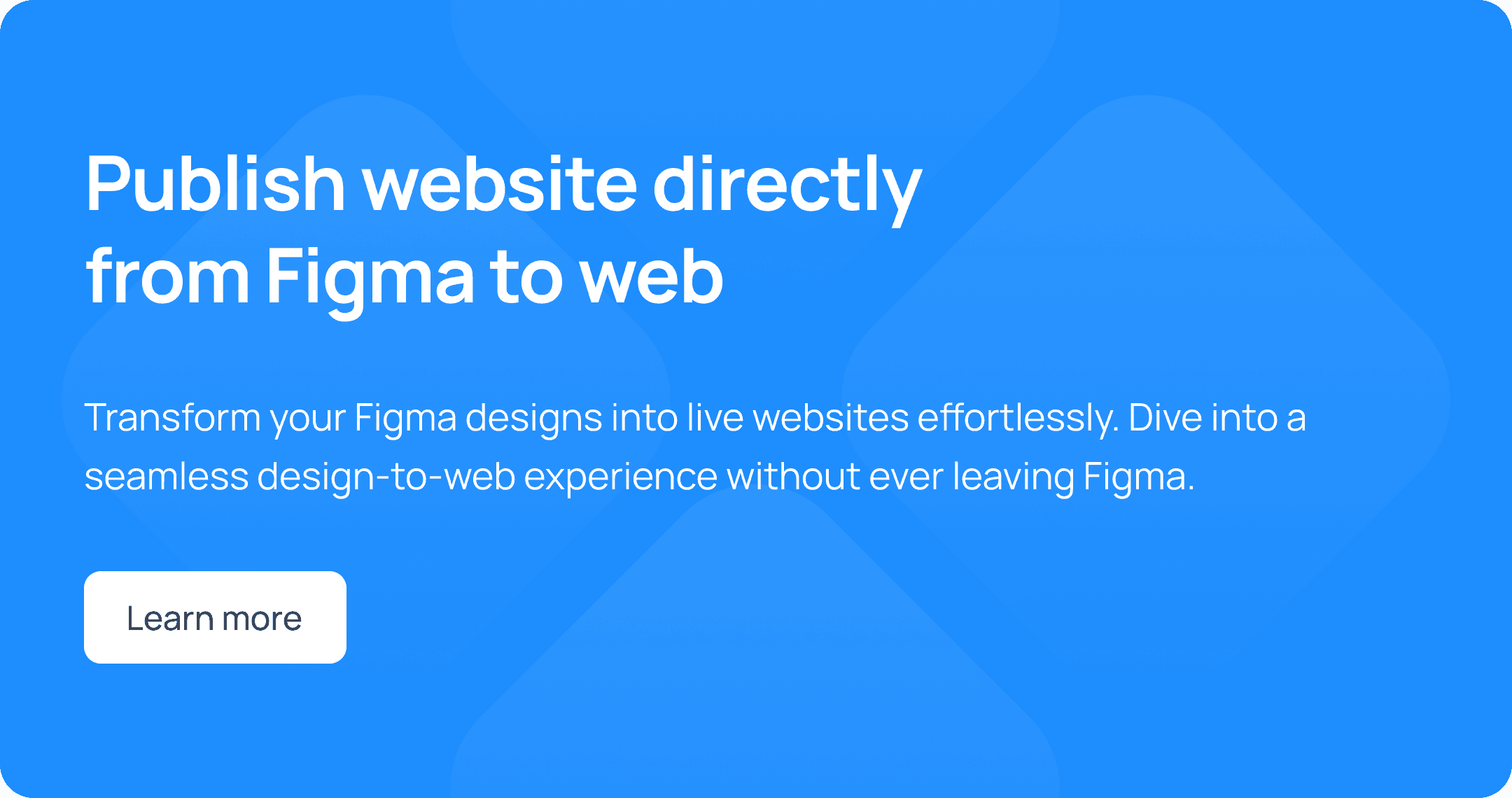Figma is a web-based design and prototyping tool that streamlines the design process for startups through real-time collaboration, interactive prototyping, and seamless developer handoff. Here are the key benefits of using Figma for startups:
Collaborative Design: Multiple team members can work simultaneously on the same file, enabling real-time collaboration and faster iterations, regardless of location.
Prototyping and Testing: Create interactive, high-fidelity prototypes directly within Figma and gather user feedback early in the development cycle.
Smooth Developer Handoff: Extract code snippets and integrate with platforms like Zeplin, ensuring a smooth transition from design to development.
Cost-Effective: Robust free tier and scalable paid plans tailored to growing teams and expanding requirements.
Consistent Design Systems: Define reusable components and styles, ensuring visual consistency across products and enhancing brand recognition.
Thriving Ecosystem: Access a vast ecosystem of plugins and community resources, extending Figma's capabilities.
The Figma Startup Program offers discounted pricing, priority support, and networking opportunities within the Figma community, helping startups bring ideas to market faster and more efficiently.
Key Benefits
Real-time Collaboration: Multiple team members can work on designs simultaneously, enabling faster iterations and seamless communication.
Prototyping and Testing: Create interactive prototypes and gather user feedback early, facilitating rapid iteration and ensuring the final product meets user expectations.
Seamless Developer Handoff: Effortlessly extract code snippets and integrate with platforms like Zeplin, minimizing the risk of inconsistencies.
Cost-Effective: Figma's robust free tier and scalable paid plans offer affordable options tailored to growing teams and expanding requirements.
Consistent Design Systems: Define reusable components and styles, ensuring visual consistency across products, enhancing brand recognition, and streamlining the design process.
Thriving Ecosystem: Access a vast ecosystem of plugins and community resources, enabling startups to leverage collective knowledge and expertise.
Challenges for Startup Design and Development
Startups often face unique hurdles when designing and developing products, especially in the early stages. Limited resources, tight timelines, and the need for rapid changes can make the design process demanding. Here are some key challenges startups commonly encounter:
From Idea to Product: The Design Journey
Turning an idea into a well-designed, tangible product is a significant challenge for startups. They need to iterate quickly while maintaining high quality. The design process involves multiple steps, including research, brainstorming, prototyping, testing, and refinement. Startups must navigate this journey efficiently, gathering user feedback and making necessary adjustments to ensure their product meets the target audience's needs.
Remote Collaboration for Teams
In today's remote work environment, startups often have teams working across different locations. Effective collaboration becomes crucial for seamless design and development. Startups need tools that bridge the gap between dispersed team members, enabling real-time collaboration, communication, and sharing of design files. Ensuring everyone is on the same page and working towards a unified vision can be challenging when teams are not co-located.
Here's a table summarizing the key challenges:
Challenges
Design Process: Transforming an idea into a well-designed product while iterating quickly and maintaining quality.
Remote Collaboration: Enabling effective collaboration, communication, and file sharing among distributed teams.
To overcome these challenges, startups require tools that streamline the design process, facilitate remote collaboration, and enable rapid iteration based on user feedback.
Figma's Key Features for Startups

Figma offers a range of tools to help startups overcome design and development challenges. By combining essential features into one platform, Figma enables startups to streamline workflows, collaborate effectively, and accelerate product development.
Real-time Collaboration
Figma's standout feature is real-time collaboration. Multiple team members can work simultaneously on the same file, regardless of location. This fosters seamless communication and efficient iteration, especially for remote or distributed teams.
Figma mirrors working together in person, with each team member's cursor visible to others. This transparency facilitates instant feedback, streamlines decision-making, and ensures everyone stays aligned throughout the design process.
Prototyping and Testing
Figma's integrated prototyping tools allow startups to create interactive, high-fidelity prototypes directly within the design environment. This eliminates the need to switch between multiple applications, saving time and ensuring a smooth transition from design to user testing.
With Figma's prototyping capabilities, startups can:
Create realistic interactions and animations: Designers can craft prototypes that closely resemble the final product, complete with overlays, transitions, scrolling, and hover interactions.
Conduct user testing: Prototypes can be easily shared with stakeholders, potential users, or focus groups, enabling startups to gather valuable feedback early in the development cycle.
Iterate rapidly: Based on user feedback, designers can quickly make adjustments to the prototype, streamlining the iterative design process and ensuring the final product meets user expectations.
Streamlined Handoff to Developers
Figma's developer handoff features facilitate a smooth transition from design to development, reducing the potential for errors and miscommunications. Designers can effortlessly extract code snippets, including CSS, iOS, and Android code, directly from their design files. This seamless integration eliminates the need for manual code generation or switching between different tools, saving valuable time and resources.
Additionally, Figma's integration with platforms like Zeplin further enhances collaboration between designers and developers, allowing for advanced measurements, code display, and asset management. By streamlining the handoff process, startups can ensure that the final product remains faithful to the original design vision, while minimizing the risk of inconsistencies or misinterpretations.
Simple Benefits for Startup Growth
Figma offers startups more than just technical tools. It helps drive business growth and scalability by simplifying workflows, boosting teamwork, and enabling cost-effective operations. This allows startups to bring ideas to market faster and more efficiently.
Budget-Friendly for Bootstrapped Startups
For cash-strapped startups, Figma's pricing is a game-changer. The robust free tier includes essential design and prototyping tools, allowing startups to kickstart projects without breaking the bank. As needs evolve, Figma's paid plans offer scalable options tailored to growing teams and expanding requirements.
Unlike traditional design software requiring expensive licenses for each user, Figma's subscription-based model ensures predictable costs and eliminates upfront investments. This cost-effective approach aligns with the lean mindset of startups, allowing them to allocate resources strategically while maintaining access to cutting-edge design capabilities.
Faster Feedback and Clear Communication
Effective communication and rapid feedback loops are crucial for startups to iterate quickly and validate their ideas. Figma's real-time collaboration and commenting features facilitate seamless communication among team members, stakeholders, and potential users.
With the ability to leave context-specific comments directly on design elements, stakeholders can provide targeted feedback, reducing the risk of misunderstandings and ensuring that everyone remains aligned throughout the design process. Version history tracking further enhances transparency, enabling teams to review previous iterations and track the evolution of their designs.
By streamlining communication and feedback, Figma empowers startups to make informed decisions, pivot when necessary, and bring products to market faster, ultimately increasing their chances of success.
Building a Consistent Design System
A consistent design system is essential for establishing brand recognition, ensuring a seamless user experience across platforms, and facilitating efficient collaboration within teams. Figma's component-based design approach and style libraries make it easy for startups to create and maintain a robust design system from the ground up.
With the ability to define reusable components and styles, startups can ensure visual consistency across their products, reducing the risk of inconsistencies and enhancing brand recognition. This approach not only improves the user experience but also streamlines the design process, enabling teams to work more efficiently and maintain a cohesive look and feel across all touchpoints.
By prioritizing a consistent design system from the outset, startups can establish a strong brand identity, foster trust with their users, and lay the foundation for scalable growth as their products and teams expand.

Real-World Examples of Figma for Startups
Figma has become a go-to tool for many startups, helping them streamline design workflows, boost collaboration, and speed up product launches. Here are two real-world examples that showcase how Figma has contributed to startup success.
Case Study: Faster Time-to-Market
Airfocus, a project management startup, adopted Figma early on and saw a significant reduction in their time-to-market. By using Figma's real-time collaboration and prototyping tools, the team could quickly iterate on designs, gather feedback, and make informed decisions.
"Figma has been a game-changer for us," said Vitaliy Isakov, Co-founder and CEO of Airfocus. "We cut our design cycle by 40%, allowing us to launch our product faster and stay ahead of competitors."
The smooth integration between designers and developers, facilitated by Figma's handoff features, further streamlined the process, ensuring a smooth transition from concept to implementation.
Improved Team Collaboration
Lunchclub, a networking platform for professionals, experienced a remarkable improvement in team collaboration after adopting Figma. With team members distributed across multiple locations, Figma's real-time collaboration and commenting features enabled seamless communication and feedback loops.
"Figma has been instrumental in fostering a collaborative culture within our design team," shared Arushi Nayar, Lead Product Designer at Lunchclub. "We can now work together in real-time, regardless of our locations, and quickly incorporate feedback from stakeholders and users."
The ability to create and maintain a consistent design system within Figma further enhanced the team's efficiency, ensuring a cohesive user experience across all touchpoints.
These success stories show how Figma has helped startups overcome design and collaboration challenges, accelerate their product development cycles, and achieve their business goals more efficiently.
Figma's Ecosystem: Plugins and Community
Figma's strength lies in its vast ecosystem of plugins and resources contributed by the community. This vibrant community helps startups extend their design process, boosting innovation and productivity.
Plugins that Save Time
Figma's plugin ecosystem offers tools to streamline workflows and automate repetitive tasks, allowing startups to focus on bringing their ideas to life. Here are some popular time-saving plugins:
Unsplash
This plugin integrates with the stock photo library Unsplash, enabling designers to search for and insert high-quality, royalty-free images directly into their Figma designs. This can be a game-changer for startups looking to create visually appealing mockups and prototypes without the hassle of sourcing and managing image assets.
Detachless
Detachless allows users to publish websites directly from Figma without switching between multiple tools. It enables designers to transform their Figma designs into live websites or export them to code seamlessly within the Figma environment.
Iconify
With over 40,000 icons available, Iconify is a must-have plugin for startups seeking to enhance their designs with professional-grade icons. This plugin simplifies the process of finding and incorporating icons, saving time and ensuring consistent visual branding across all design assets.
Figmotion
Figmotion allows designers to create and integrate animations directly within Figma, eliminating the need for separate animation tools. Startups can leverage animations to create engaging user experiences and bring their products to life.
Slack Integration
Figma's Slack integration facilitates seamless communication and feedback loops. With this integration, team members can receive notifications, share designs, and provide comments directly within their Slack channels, fostering real-time collaboration and streamlining the design process.
These are just a few examples of the numerous plugins available in Figma's ecosystem. By leveraging these tools, startups can optimize their design workflows, enhance collaboration, and ultimately deliver better products to market faster.
Connecting with the Figma Community
A key benefit of the program is connecting with the global Figma design community. Startups can:
Get guidance and feedback on designs from experienced professionals
Stay updated on the latest design trends and techniques
Collaborate with other startups and share insights on common challenges
Access community-contributed resources, plugins, and templates
By fostering collaboration and knowledge-sharing, startups can refine their products, enhance design skills, and gain a competitive edge.
Success Stories
Figma has helped startups improve design workflows, increase team collaboration, and enhance overall design quality. Here are some testimonials:
Startup Testimonials
Fintech Startup: "The discounted pricing and priority support allowed us to focus resources on product development, while the community connections provided invaluable insights and mentorship."
E-commerce Startup: "Joining the program was one of the best decisions. We gained access to a powerful design tool and tapped into a vibrant community that helped elevate our product's user experience."
These stories highlight the benefits startups can experience, including cost savings, enhanced support, networking, and collaboration opportunities.
Conclusion: Figma for Startup Success
Figma stands out as the ideal tool for startups aiming to streamline design processes, boost teamwork, and deliver top-notch products. By utilizing Figma's powerful features, startups can overcome common hurdles and unlock new levels of efficiency and creativity.
With real-time collaboration capabilities, Figma enables distributed teams to work together seamlessly, eliminating communication barriers and allowing for faster iterations. Built-in prototyping and testing tools let startups validate designs early, gather user feedback, and refine their products before launch. Plus, the smooth handoff to developers ensures a smooth transition from design to development, minimizing errors and reducing time-to-market.
Figma's cost-effectiveness and scalability make it an attractive choice for bootstrapped startups, providing access to professional-grade design tools without significant upfront costs. As the startup grows, Figma's flexible pricing plans can accommodate expanding design teams and projects.
By fostering open communication, faster feedback loops, and consistent design systems, Figma equips startups with the tools to bring their ideas to life efficiently and effectively. The platform's thriving ecosystem of plugins and community resources further amplifies its capabilities, enabling startups to leverage the collective knowledge and expertise of designers worldwide.
Figma exemplifies the platform's commitment to supporting entrepreneurial ventures, offering discounted pricing, priority support, and networking opportunities within the Figma community. Success stories from startups that have leveraged the program underscore the tangible benefits of adopting Figma, including improved design workflows, enhanced team collaboration, and elevated product quality.
In the dynamic and competitive landscape of startups, Figma emerges as a game-changer, empowering businesses to design, iterate, and deliver top-notch products with unparalleled efficiency and collaboration. By embracing Figma, startups can unlock their full creative potential and gain a competitive edge in the market.
Key Benefits of Figma for Startups
Benefits
Real-time Collaboration: Multiple team members can work on designs simultaneously, regardless of location, enabling faster iterations and seamless communication.
Prototyping and Testing: Create interactive prototypes and gather user feedback early in the development cycle, facilitating rapid iteration and ensuring the final product meets user expectations.
Seamless Developer Handoff: Effortlessly extract code snippets and integrate with platforms like Zeplin, ensuring a smooth transition from design to development and minimizing the risk of inconsistencies.
Cost-Effective: Figma's robust free tier and scalable paid plans offer affordable options tailored to growing teams and expanding requirements, aligning with the lean mindset of startups.
Consistent Design Systems: Define reusable components and styles, ensuring visual consistency across products, enhancing brand recognition, and streamlining the design process.
Thriving Ecosystem: Access a vast ecosystem of plugins and community resources, extending Figma's capabilities and enabling startups to leverage collective knowledge and expertise.
Figma For Startups Benefits
1. Discounted Pricing: Startups can access Figma's professional plans at discounted rates, allowing them to focus resources on product development.
2. Priority Support: The program provides priority support, ensuring startups receive timely assistance and guidance.
3. Community Connections: Startups can connect with the global Figma design community, gaining insights, feedback, and mentorship from experienced professionals.
4. Collaboration Opportunities: The program fosters collaboration and knowledge-sharing among startups, enabling them to learn from each other's experiences and challenges.
5. Access to Resources: Startups can tap into community-contributed resources, plugins, and templates, further enhancing their design workflows and capabilities.





